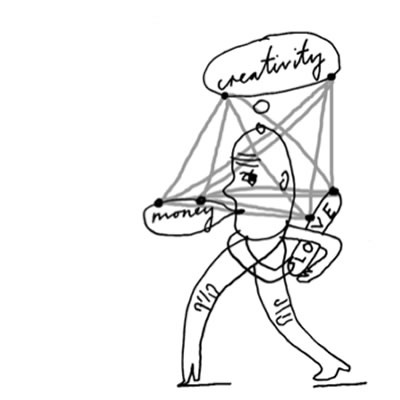First published on November 2011.
When technology and working practices are changing so fast, is there enough emphasis on learning to learn rather than teaching kids stuff? Young people are pretty clever! And talented!
They grow up with the technology of the day and have always been natural early adopters. Be it pen, pencil, print, radio, film, TV or photography, they all provided tools for the young to extend and express themselves.
Those that had access to these media in their childhood would have used them. Those that had additional reading, writing, science and maths skills would have applied them to better themselves, gain employment and contribute to society.
Of late, it’s been the role of education to provide the core cognitive and analytic skills to enable young people to learn. The arts and crafts are add-ons, curriculum nice-to-haves, not must-haves.
It’s not always been that way. In the past, arts and sciences were studied together, and some of the most innovative and entrepreneurial individuals of the past were as much poet as inventor, mathematician or physicist as artist or designer. They were called artisans. Today they might be called creative engineers and are more likely to work as production teams, sharing each other’s creative and technical skills for their common projects. We need to encourage this today.
New technology and digital media engage young people from the day they enter the world. The TV, PC, mobile, smartphone and now iPad and social media are increasingly easy to use and immediately rewarding. In addition, they are driving the industries of the world they are inheriting. If we don’t create the education systems to value and teach the arts and scientific skills, knowledge and endeavour, our young people will be disadvantaged.
It’s not easy. Technology, digital media, software and apps move at such a speed, it’s not easy for adults and teachers to keep up with young people’s adoption and enjoyment. However, it is incumbent upon educators and those designing schools and curricula to embrace the speed of change. But it’s equally important to support young people to see behind the screens and reveal how the magic of media, algorithms and data manipulation, content creation, distribution and IP exploitation are made. In this way, they will learn how to produce new and innovative applications and products of the future.
To achieve this, education has to get closer to young people’s daily adoption of media and technology by providing the tools, support and channels to get their productions out into the world to be tried and tested by audiences. This can be done through digital platforms built and managed by schools.
At Maverick, we encourage work placements from secondary, HE, graduate and postgraduate placements. This has been valuable to the young people in expanding their education and providing creative industrial experience. Many have gone on to gain employment and, in some cases, develop their own businesses. We’ve also worked with Channel 4 in particular to offer R&D opportunities and develop online ‘ideas factories’ that might once have been the domain of educational TV or ‘backup support’, but are now delivering multiplatform media solutions that enhance interactive and personalised experiences for large audiences.
In these programmes, young people were motivated to apply themselves and their academic and practical understanding of ever-changing media. In many cases, they bring their contemporary understanding and user experience to create new ideas, answers and applications. Experienced researchers, producers, directors, production managers and accountants give their time and take young people seriously.
Many of the lessons learned through these small but instructive programmes have come together in the plans for a Creative and Digital Media Academy to be opened in the city centre of Birmingham, UK. The Birmingham Ormiston Academy (BOA) is driven by a commitment to young people’s access and engagement with creative and digital media industries’ education and knowledge.
The Academy is built upon commitments from the Ormiston charity to support young people who are disadvantaged by not having access to education; Birmingham City University’s commitment to creative industrial education and The BRIT School who have worked with the music industry in exemplary ways to create an educational community that is motivated, respectful, talented and successful.
One of the practical lessons learned to great educational effect is the benefit of hiring media, theatre and music professionals as teachers! They were helped to recognise and use their pedagogical skills, without being forced to become creative industry/media teachers. Instead, these industry professionals were supported in bringing their knowledge and modus operandi to young people.
Another lesson is the focus on performance through putting on shows on a daily basis throughout the year and across London. The BOA team will learn from these examples and add in digital media opportunities to create platforms for young people to ‘produce and perform’ 24/7. As much of the pupils’ production will be digital, it will be shared with other schools, industries and audiences.
Creative industrial partners from production resource companies to rep theatres, broadcasters, digital agencies, venues and community arts and media organisations in Birmingham and the Midlands are warming to the Academy’s ambitions as the first term begins.
Together, we look forward to seeing the meshing of creative industries, sciences and technologies with the development of talent behind and in front of the screens that will reward young people’s commitment to learning, endeavour and entrepreneurship, and contributing to their society.
 Creativity Money Love: Learning for the 21st Century by Creative & Cultural Skills is licensed under a Creative Commons Attribution-NonCommercial-NoDerivs 3.0 Unported License.
Creativity Money Love: Learning for the 21st Century by Creative & Cultural Skills is licensed under a Creative Commons Attribution-NonCommercial-NoDerivs 3.0 Unported License.
Illustrations by Paul Davis - http://copyrightdavis.blogspot.com/


